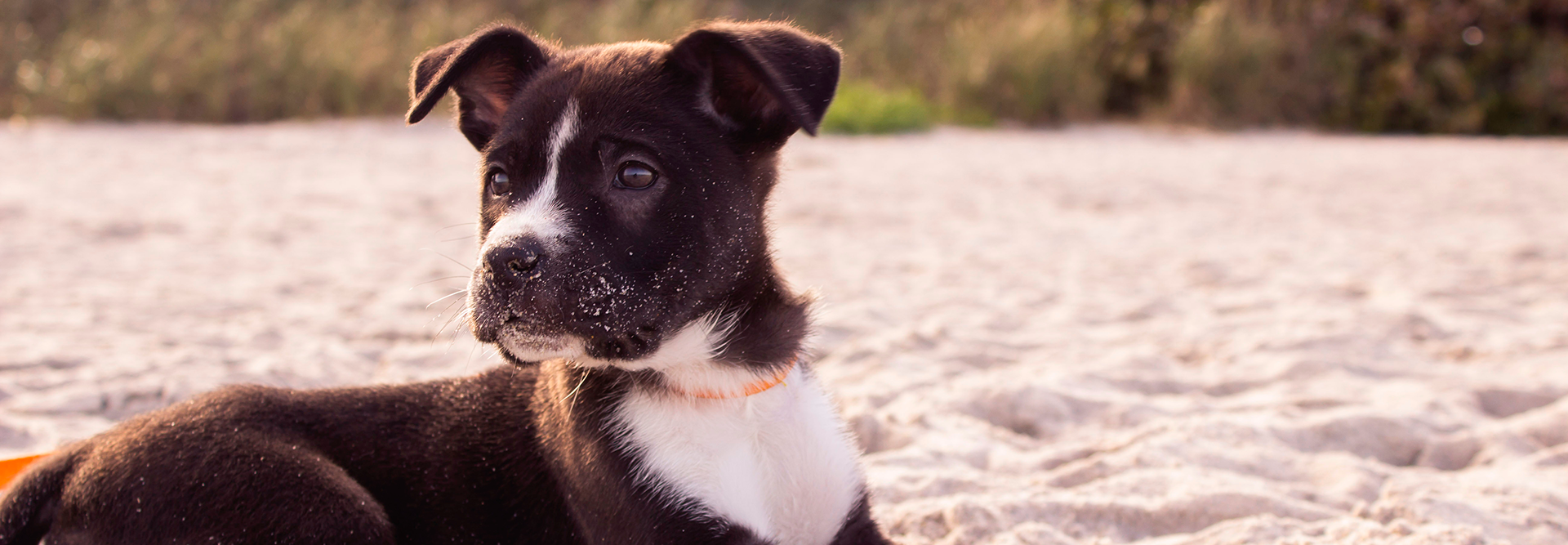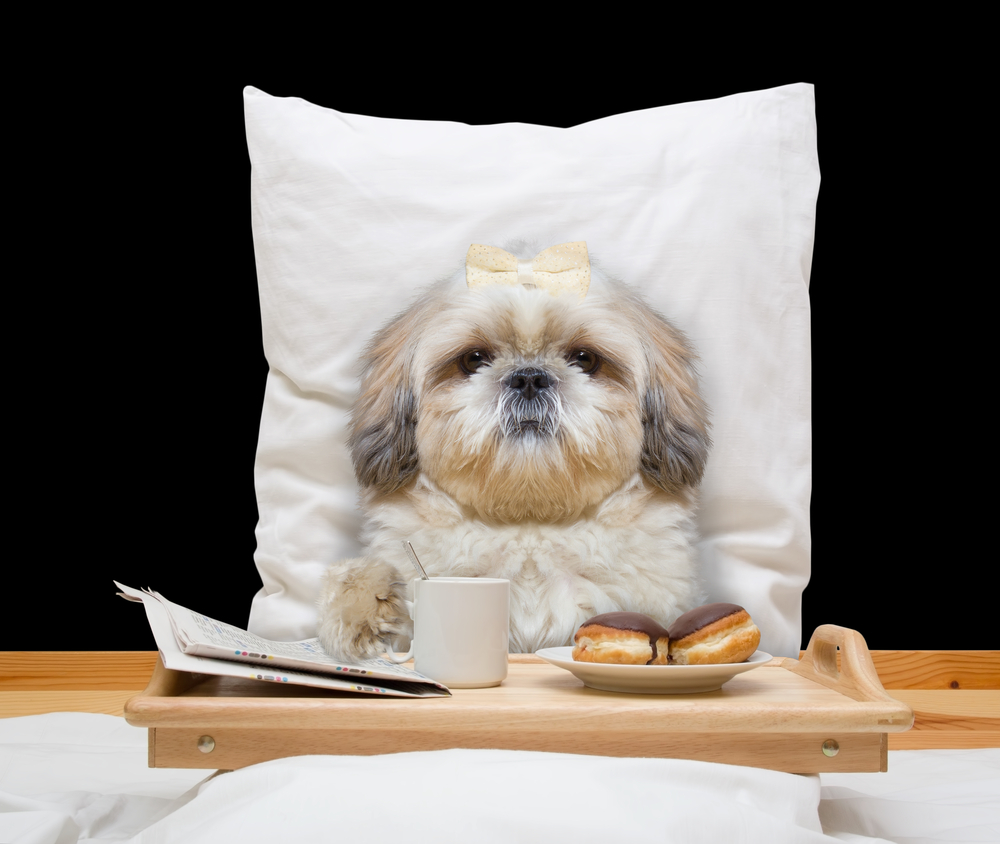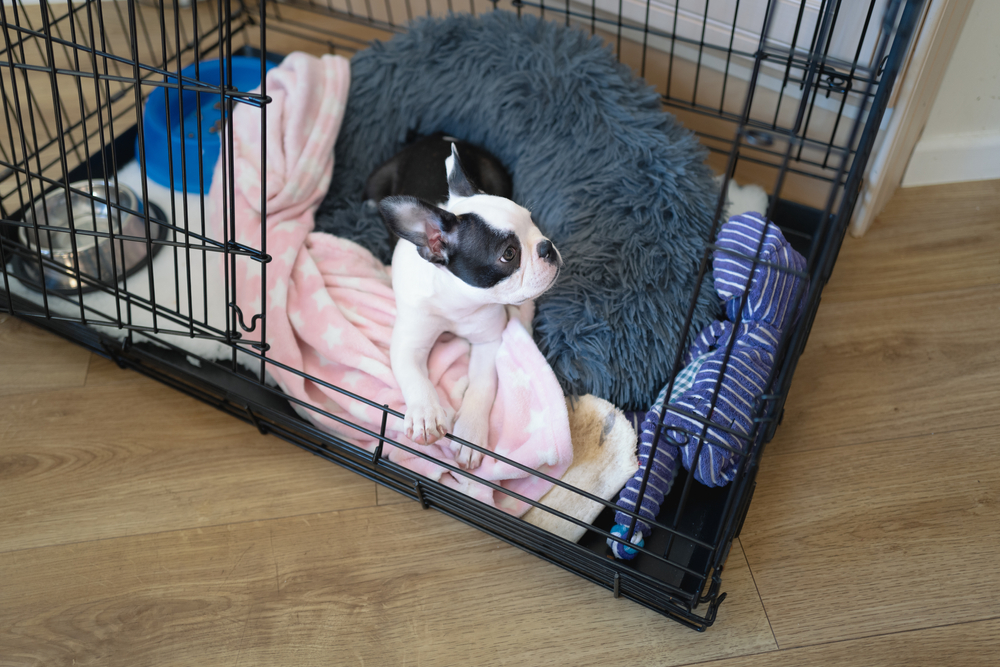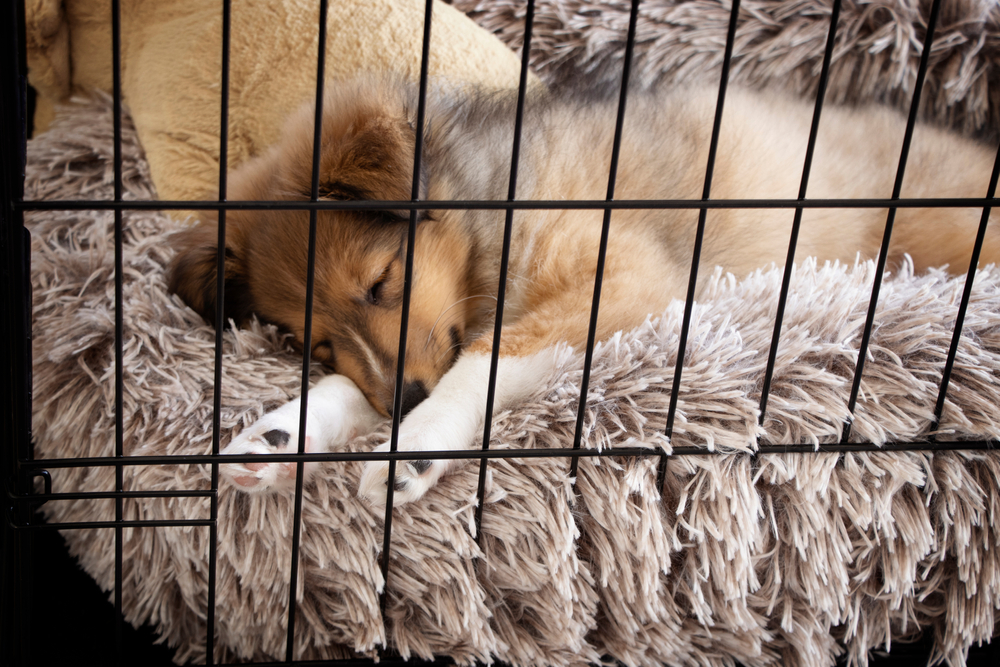
Puppies experience many significant transitions, back-to-back, during the first few months of their lives. They’re born, wean with their littermates, transfer to pet stores where they meet new puppies, and then transfer again into loving homes. The transition with the greatest change is leaving the other pet store puppies and being in a home. This […]
Puppies experience many significant transitions, back-to-back, during the first few months of their lives. They’re born, wean with their littermates, transfer to pet stores where they meet new puppies, and then transfer again into loving homes. The transition with the greatest change is leaving the other pet store puppies and being in a home. This is the first time a puppy does not have other puppies to snuggle up to and sleep with. And this is the primary reason your new puppy cries at night.
The good news is that as the newness of this transition wears off and your puppy adjusts to life with you and your family, he will naturally grow comfortable and stop crying.
We know that hearing your puppy cry at night can be agonizing. You might feel helpless and not know what to do. Many pet parents, when they hear their puppies whimpering, don’t know what to do other than bring their puppies into their beds.
But allowing your puppy to sleep with you in bed is the worst option.
Instead, we recommend crate training your puppy by implementing the following 5 tips:
Even with these tips, it will still take some time for your puppy to adjust to his new home and routine. Our best advice is for you to be patient and rest assured that once your puppy gets used to his crate and having his own special personal space, he will love it.

One of the reasons your puppy might whimper at night is because he wants your attention and company. He doesn’t understand why you aren’t with him and so he’s crying in order to get you to join him in his crate.
The main issue here isn’t that your puppy is trying to get your attention, but rather that your puppy has enough energy to determine that he could be playing with you right now. He’s awake. He feels energized. So, why should he be cooped up in his crate all alone?
The solution for this is to take the time to tire your puppy out. In the evening, perhaps an hour before bedtime, take your puppy for a walk around the block or into the backyard for a game of fetch, or you can even play tug-of-war with a doggy rope inside. Give your puppy between a half-hour and 45 minutes of exercise that includes bursts of heart-pounding cardio. This will help your puppy to discharge all that natural puppy energy so that by the time his head hits the pillow, he’ll be far more likely to fall asleep quickly.

Your puppy crying from his crate at night to get your attention isn’t always the result of him being lonely. In fact, it’s quite possible that your puppy has a really good reason for wanting your immediate attention. He may need to go to the bathroom. Or if he’s still being potty trained, he may have had an accident that he doesn’t want to have to sleep in.
Given that your puppy may have had an accident or may need to be taken outside right away, it’s never a good idea to ignore your puppy. But eventually, you’ll get a good feel for when your puppy is whining to be taken out, or whining to test your boundaries.
In order to reduce the likelihood that your puppy may need to urgently be taken outside at night, we recommend that you avoid feeding him or giving him water for 1.5 – 2 hours before bedtime. You may need to experiment with the latest time you can feed your puppy in the evening, which is no easy feat. Sometimes puppies cry at night because they’re hungry. Before long, you’ll find the sweet spot for giving your puppy an evening snack that “times well” with his before bathroom trip outside. And this way, you can avoid pee and poop accidents in the crate at night.

Because a common reason that puppies cry at night is because they need to be taken outside to go to the bathroom, we recommend that one final bathroom trip before bed should be part of your puppy’s nightly bedtime routine.
As your puppy learns the house rules and becomes potty trained and housebroken, he’ll gradually learn how to hold his bladder as well as get better at communicating with you his need to go outside. When you build-in automatic bathroom breaks throughout the day and evening, breaks that occur at the same times each day, your puppy will actually catch on to those “times” and be able to anticipate the opportunities.
This helps to strengthen both his bladder and his patience! But bear in mind that this is a process that could take weeks-to-months.
When you include a bathroom trip outside right before bed and later in the night your puppy still cries, at least you can “rule out” his need to go to the bathroom. Granted, it’s possible he may need to go to the bathroom again. But more likely than not, he will be crying for a different reason.

Puppies are a lot like babies, and a lot like you, for that matter! They cry when they’re uncomfortable, as well as when their basic needs aren’t being met. We trust that you’re meeting your puppies basic needs, of course, but are you sure that he’s perfectly comfortable in his crate?
Crates look like cages and there really isn’t anything comfortable about sleeping in a cage. Crates also have the potential to look and feel like dens, which puppies love. For this reason, it’s important to transform your puppy’s crate into a cozy, comfortable den.
If your crate has a hard floor, we advise that you fold and fit a cozy blanket over the floor. The crate size should be large enough for your puppy to stretch out, lying down, and for there to still be additional room for you to lay out a pee pad. Be sure that there’s at least one pee pad in a corner of the crate. Place a puppy or dog bed on top of the blanket in a cozy corner opposite the pee pad.
Put an old, worn T-shirt of yours on the dog bed, and maybe a favorite toy like a stuffed animal. Finally, we recommend that you drape a blanket over the top of the crate so that it really feels like a safe den. The one caveat to bear in mind is that you’ll want your puppy to have fresh air all night. So you may have to play around with how you drape the blanket. It may be the case that you can only drape it over ¾ of the top of the crate to ensure adequate air flow.
Now that the crate is cozy, consider the temperature of the room. Is your home drafty? Or is it hot and humid? Just like you, your puppy will be most comfortable in warm air that isn’t too humid. Puppies’ body temperatures tend to drop when it’s cold and they have a harder time staying warm when they’re by themselves, so if you live in a cold-weather climate, you might want to bump the thermostat up.

This is perhaps the most helpful tip we can give you as you raise your puppy. Puppies like fixed routines. Routines help them feel secure and give them a sense of community and purpose because they can anticipate “what’s next” and be helpful in terms of getting ready. For example, if you take your puppy out for his “long walk” every day at 2pm, you might discover that at 1:50pm he fetches his leash and finds you! Routines will also help your puppy trust you and be able to be there for you as your companion, too.
By having a fixed bedtime routine, your puppy will catch on and cooperate, because it’s in his nature to obey the structure of the pack leader—you!
A healthy bedtime routine for a puppy should include rigorous exercise, as we suggested, a bathroom trip outside, tucking your puppy into his crate, and giving him comforting pats before you climb into your own bed.
Even with a fixed routine that includes opportunities for discharging his extra energy and emptying his bladder, your puppy might still whine and cry after you leave him to sleep alone in his crate. Sometimes, you can do everything right and your puppy will still feel anxious and lonely. You didn’t do anything wrong. This is an instance when you need to be patient with both your puppy and yourself.
At times like this, we recommend that you hold off from immediately jumping to tend to your puppy. If he whines, whimpers, and cries, give him a few minutes to see if he’ll self-soothe and quiet down. If 10 – 15 minutes go by and your puppy is still crying, then go in and check on him. It could be the case that he used his pee pad or there’s some other issue he needs your help with.
As the nights go by, your puppy should become capable of self-soothing and soon be able to sleep alone. Use your best judgment before checking on him. Try to allow for more time to go by to help your puppy learn that sleeping alone in his crate is a house rule he must live by.
The entire team at Petland Florida wishes you the best of luck with your new puppy! And if you’re ready for a new puppy or want to become a first-time pet parent to an adorable pup, the dog breed experts at Petland can help! Our trained staff are experienced in matching people with the right breeds to fit their homes and lifestyles. Stop in one of our Florida locations to meet your future furry friend!